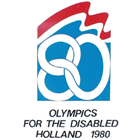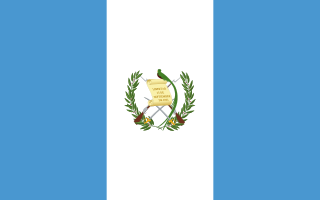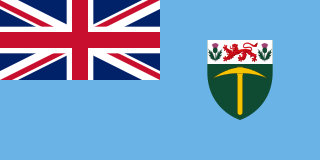| Dartchery at the VI Paralympic Games | |
|---|---|
 | |
Dartchery at the 1980 Summer Paralympics consisted of three events.
| Dartchery at the VI Paralympic Games | |
|---|---|
 | |
Dartchery at the 1980 Summer Paralympics consisted of three events.
| Event | Gold | Silver | Bronze |
|---|---|---|---|
| Men's pairs open | |||
| Women's pairs open | Gill Matthews Valerie Williamson | ||
| Mixed pairs open |

The 1964 Summer Paralympics, originally known as the 13th International Stoke Mandeville Games and also known as Paralympic Tokyo 1964, were the second Paralympic Games to be held. They were held in Tokyo, Japan, and were the last Summer Paralympics to take place in the same city as the Summer Olympics until the 1988 Summer Paralympics.

The 1972 Summer Paralympics, the fourth edition of the Paralympic Games, were held in Heidelberg, West Germany, from 2 to 11 August 1972. The games ended 15 days before the 1972 Summer Olympics held in Munich, also in West Germany.

The 1980 Summer Paralympics, branded as the Olympics for the Disabled, were the sixth Summer Paralympic Games. They were held in Arnhem, Netherlands, from 21 to 30 June 1980.

Athletics at the 1980 Summer Paralympics consisted of 275 events. The Games saw 1,973 Para athletes from 43 countries compete in 13 sports.

Dartchery at the 1976 Summer Paralympics consisted of three events.

Dartchery at the 1972 Summer Paralympics consisted of three events.

Dartchery at the 1968 Summer Paralympics consisted of a mixed pairs event.

Dartchery at the 1964 Summer Paralympics consisted of a mixed pairs event. France and Belgium both sent one competitor each to form a team.

The 1960 Summer Paralympics marked the introduction of the sport of Dartchery as a paralympic sport. Dartchery at the 1960 games was a mixed pairs event.

France competed at the inaugural Summer Paralympic Games in 1960 in Rome. France's six athletes competed in four sports: archery, athletics, dartchery and swimming. All of France's athletes obtained medals in every event they competed in.

Japan was the host country of the 1964 Summer Paralympics in Tokyo, which also marked its first participation in the Paralympic Games. It was the only Asian country to take part in the Games.

Guatemala have been irregular participants in the Paralympic Games. The country made its début at the 1976 Summer Paralympics in Toronto, with a delegation of eleven athletes to compete in archery, dartchery, swimming, table tennis and weightlifting. It was then absent in 1980, and returned in 1984, with a delegation of two swimmers and two weightlifters. It sent a single weightlifter to the 1988 Games, then was absent for sixteen years, before returning for the 2004 Paralympics, represented by two runners. Visually impaired 5,000m runner César López was the sole Guatemalan competitor in 2008. Guatemala has never taken part in the Winter Paralympics.

Finland competed at the 1976 Summer Paralympics in Toronto. The country was represented by 50 athletes competing in archery, athletics, dartchery, swimming, table tennis, volleyball, weightlifting and wheelchair basketball.

Dartchery was contested at the Summer Paralympic Games from 1960 to 1980. Competitions were carried out in pairs: mixed pairs from 1960 to 1980, and men's pairs and women's pairs from 1972 to 1980.

South Africa was one of twenty-eight nations that sent athletes to compete at the 1968 Summer Paralympics in Tel Aviv, Israel from 4 to 13 November 1968. The team finished tenth in the medal table and won a total of twenty-six medals; nine gold, ten silver and seven bronze. Eight South African athletes competed at the Games; five men and three women.

Spain was one of twenty-eight nations that competed at the 1968 Summer Paralympics in Tel Aviv, Israel from November 4 to 13, 1968. The team finished twenty-first in the medal table and won four medals: three silver and one bronze, all in swimming events. The Spanish team contained eleven athletes; nine men and two women.

Rhodesia competed at the 1968 Summer Paralympics in Tel Aviv, Israel from 4 to 13 November 1968. The team ranked eleventh out of the twenty-eight competing nations in the medal table and won a total of twenty medals; six gold, seven silver and seven bronze. Rhodesia competed at the Paralympics in 1968 and in 1972 despite being excluded from the Summer Olympic Games in those years.

South Africa took part in the 1976 Summer Paralympics in Toronto, Ontario, Canada. The country was represented by 39 athletes, twenty-nine male and ten female. South Africans competed in archery, athletics, dartchery, lawn bowls, swimming, table tennis and wheelchair basketball. They won twenty six medals in total: six golds, nine silvers and eleven bronze, finishing 19th on the medal table.

Irene Monaco is a former Italian a paralympic multi-sport athlete who won ten medals at the Summer Paralympics from 1964 to 1984.